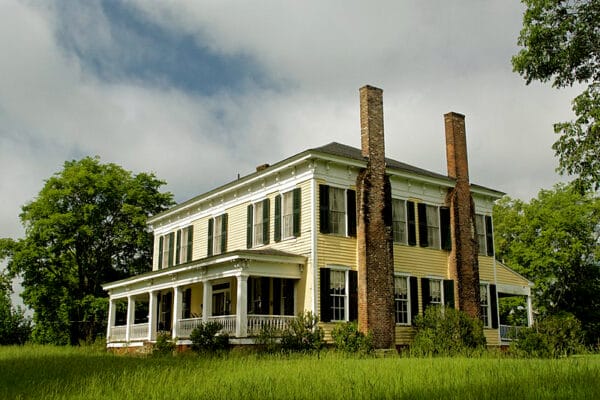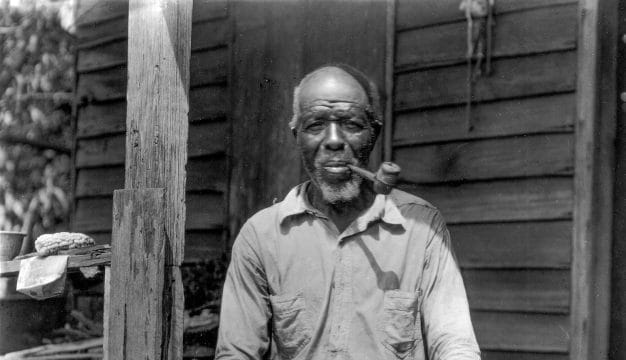Emelle
Emelle is located in west-central Sumter County in the west-central part of the state. It has a mayor/city council form of government. Artist Thornton Dial and musician Cleo “Big Bo” McGee were born in Emelle.
History
 Oakhurst
The area of Alabama‘s Black Belt region in which present-day Emelle is located was first settled in the 1830s and was primarily a farming community, with cotton being the principle crop. The town of Emelle was established in 1912 with the completion of the Alabama, Tennessee, and Northern Railroad. Joseph Dial sold the land for the right of way, and the town was supposedly named after his daughters, Emma and Ella Dial. More likely, it was named after the daughter of Edward Dial, Joseph Dial’s son, who also sold land and whose daughter’s name was Emelle, as Joseph Dial died in 1885, 25 years before the town was named. On July 5, 1930, the town was embroiled in what has come to be known as the Robinson Riot. It began with a dispute over a debt between Ollie Robinson, an African American customer, and white store owner Clarence Boyd. Local reports state that the two men became physical and that members of the Robins and Boyd families came to the defense of their respective relatives. After the Robinsons departed the store, a large gang of white men gathered and pursued them. By the end of the conflict, the gang had lynched Esau Robinson, several other African Americans and one other white resident had been murdered, and the Robinsons’ home was burned to the ground.
Oakhurst
The area of Alabama‘s Black Belt region in which present-day Emelle is located was first settled in the 1830s and was primarily a farming community, with cotton being the principle crop. The town of Emelle was established in 1912 with the completion of the Alabama, Tennessee, and Northern Railroad. Joseph Dial sold the land for the right of way, and the town was supposedly named after his daughters, Emma and Ella Dial. More likely, it was named after the daughter of Edward Dial, Joseph Dial’s son, who also sold land and whose daughter’s name was Emelle, as Joseph Dial died in 1885, 25 years before the town was named. On July 5, 1930, the town was embroiled in what has come to be known as the Robinson Riot. It began with a dispute over a debt between Ollie Robinson, an African American customer, and white store owner Clarence Boyd. Local reports state that the two men became physical and that members of the Robins and Boyd families came to the defense of their respective relatives. After the Robinsons departed the store, a large gang of white men gathered and pursued them. By the end of the conflict, the gang had lynched Esau Robinson, several other African Americans and one other white resident had been murdered, and the Robinsons’ home was burned to the ground.
The town incorporated in 1981. Emelle is the site of the largest hazardous waste site in the United States, built in 1978 by Chemical Waste Management, Inc., and operated by the company. The landfill was the subject of national attention during protests for its location in one of the poorest parts of the state in a majority African American town, drawing charges of environmental racism from opponents of the project.
Demographics
According to 2020 Census estimates, Emelle recorded a population of 76. Of that number, 80.3 percent of respondents identified themselves as African American, and 19.7 percent as white. The town’s per capita income was $22,972.
Employment
According to 2020 Census estimates, the work force in Emelle was divided among the following industrial categories:
- Educational services and health care and social assistance (35.5 percent)
- Transportation and warehousing, and utilities (32.3 percent)
- Manufacturing (19.4 percent)
- Public administration (9.0 percent)
- Arts, entertainment, and recreation, and accommodation and food services (6.5 percent)
- Other services, except public administration (3.2 percent)
Education
Students in Emelle attend Sumter County schools; no public schools are located within the town limits.
Transportation
State Highway 17 crosses the eastern side of Emelle, going north-south.
Events and Places of Interest
Oakhurst, a historic home built by Mobile cotton factor Augustus Anthony Winston in 1854, is listed on both the Alabama Register of Landmarks and Heritage and the National Register of Historic Places.
Additional Resources
Sumter County Heritage Book Committee. The Heritage of Sumter County, Alabama. Clanton, Ala.: Heritage Publishing Consultants, 2005.



